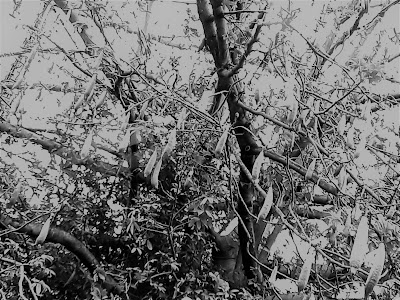by Anne White
Ideas are everywhere, in the words and, so to speak, behind the words, present because they are literally present and present even if they appear to be absent. A writer may despise the idea of zoos and communicate that hatred by writing a book about animals in the bush, never mentioning zoos, never alluding to zoos or dropping a hint about zoos. Because of the way the mind works, we get the message...If you picture a page of writing as three-dimensional, with the words hovering a half-inch or so above the paper, then you begin to see where the ideas are: behind the words, between the words, really everywhere. (Eric Maisel, Deep Writing)
In Jan Karon’s novel Out to Canaan, people in Mitford are feeling overworked and stressed by a variety of situations. Partway through the book, Father Tim invites his parishioners to a special evening church service, and as they recite the prayer of confession, we are given a glimpse of what is going on in their minds.
“Most merciful God,” Esther Bolick prayed aloud and in unison with the others from the Book of Common Prayer, “we confess that we have sinned against You in thought, word, and deed…” She felt the words enter her aching bones like balm.
“…by what we have done,” prayed Gene, “and by what we have left undone.”
“We have not loved You with our whole heart,” intoned Uncle Billy Watson…He found the words of the prayer beautiful. They made him feel hopeful and closer to the Lord, and maybe it was true that he hadn’t always done right by his neighbors, but he would try to do better, he would start before he hit the street this very night.
Now, setting questions of religious faith aside just for the moment, the point is that there is something going on here that transcends the levels of understanding, the social backgrounds and whatnot of the people praying. One big reason that this prayer speaks to Esther, Gene, Uncle Billy, and others I did not include here, is that the words, as Eric Maisel says, have dimensionality. The words, the sentences, are allowed to live, and to give life. There is enough space above them, between them, and underneath them, for each person to find green pastures and quiet waters.
This is, in effect, the definition of a living book, and also of a living education. In Home Education, Charlotte Mason acknowledges that much good educational theory has been "conceived and perfected by large hearted educators to aid the many sided evolution of the living, growing, most complex human being"; it respects our own dimensionality (perhaps another way of saying "personhood").
However, we tend to take such vital, free-fluttering ideas, and pin them down on collecting boards, labelling and cataloguing them, but ignoring the fact that they will never fly again. Charlotte says, "but what a miserable wooden system does it become in the hands of ignorant practitioners!...the observing of rules until the habit of doing certain things, of behaving in certain ways, is confirmed, and, therefore, the art is acquired––is so successful in achieving precise results, that it is no wonder there should be endless attempts to straiten the whole field of education to the limits of a system" (p. 9).
These systems, these books, these artificially-generated things, are "precise" but also "straitened"; there is no room in them for us to move or breathe. I once wrote on our family blog:
... the stuff that gets used the least here is usually something produced specifically for the classroom...Case in point: a music-and-math resource book...which has such classic songs in it as this (sung to the tune of Three Blind Mice): "Let's make a people graph / Let's make a people graph / Of all our friends / In the classroom. / Boys stand over here. / Girls stand over there. / Then line up in two rows / So we can compare, / So we can compare." My daughter says she'd rather sing "Aiken Drum" any day.Charlotte said the same thing:
The promoters of the kindergarten system have done much to introduce games of this, or rather of a more educational kind; but is it not a fact that the singing games of the kindergarten are apt to be somewhat inane? Also, it is doubtful how far the prettiest plays, learnt at school and from a teacher, will take hold of the children as do the games which have been passed on from hand to hand through an endless chain of children, and are not be found in the print-books at all. (Home Education, p. 82)
Near the end of Home Education, Charlotte discusses the religious training of young children, and she pulls no punches on what we might call un-dimensional teaching:
There is no more fruitful source of what it is hardly too much to call infant infidelity than the unreal dead words which are poured upon children about the best things, with an artificial solemnity of tone and manner intended to make up for the want of living meaning in the words. Let the parent who only knows one thing from above teach his child that one; more will come to him by the time the child is ready for more. (pp. 346-347)
So, let the parent who knows no more than one prayer-book prayer, one or two good hymns by heart, a couple of folk songs, a favourite tale, and the names of one butterfly, two trees, or three wild flowers, share these things freely. Let the ideas that are present take flight, and those that are absent also be noticed by their absence. God will surely bless such an education more than He will a whole heap of unreal dead-leaf words, though they be raked ever so neatly into piles.
As the butterfly said...Amen.










